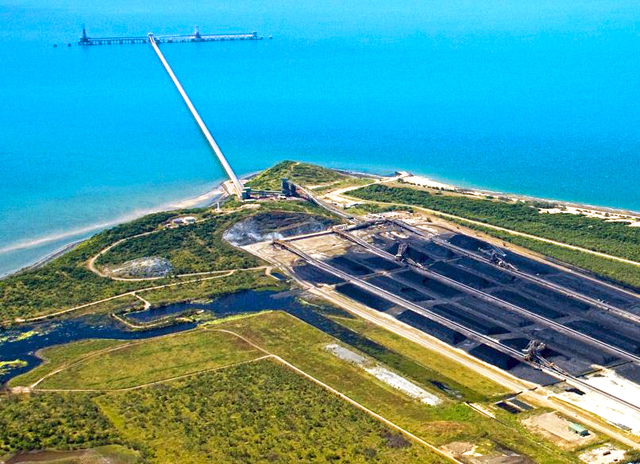A wealth of ideas is waiting out there to help fill the climate policy vacuum, but who’s listening?

Abbot Point coal terminal and loading facility, in Great Barrier Reef waters near Bowen, Queensland.
There’s the odd spark of light in the perpetual twilight of government climate action around Australia, signs that some in the halls of power have begun to sense that all is not well.
Renewable energy, transport and urban planning policies put South Australia, Victoria and the ACT ahead of the pack, but NSW, Queensland and Western Australia have pockets of achievement, with a growing legion of local governments and communities leading the charge.
In Tasmania, some councils have shown initiative in developing more climate-friendly policies. There are even hints that a state government which once called itself a climate leader is starting to realise that it’s not, and has some catching up to do.
Tasmanian energy minister Matthew Groom has had the good sense to appoint Tony Concannon to his Energy Security Taskforce. Concannon, once CEO of the company that ran Australia’s biggest and dirtiest coal-power station, is now chair of Reach Solar Energy.
From Reach’s current work in South Australia, Concannon knows something that has long eluded Tasmanian decision-makers: that new storage and transmission technologies enable wind and solar to do some seriously heavy lifting in power generation.
Government inaction in this space has spawned a new national Renewable Energy Party, which seeks a much faster solar and wind rollout and fairer feed-in tariffs. In Hobart on Friday it introduced local candidates for the Senate and the lower-house seats of Bass, Braddon and Lyons.
REP’s emergence is a sign that governments are not grasping the grave climate threat or actively looking for solutions, and it’s not just a Coalition problem. Last week senator Lisa Singh joined other Labor MPs opposing their party’s climate-unfriendly policy of diesel tax rebates for miners.
Politics is said to be the art of the possible, but how do we define what’s possible, and how do we know until we try? In revealing the limitations of the old orthodoxies, our changing world offers opportunities to lift our eyes and push back the boundaries.
One of those outmoded orthodoxies is the idea that coal is essential to Australia’s economic well-being. Taking full account of its emissions and considering other possibilities, coal seems eminently expendable, especially considering the plight of the Great Barrier Reef.
Last week the ARC Coral Reef Studies Centre announced that an aerial survey of 911 reefs off Queensland showed more than half to be severely bleached and only 8 per cent unaffected. Could there be any stronger evidence that the Reef is facing an existential crisis?
The clear evidence is that warming ocean waters caused the bleaching and, if emissions aren’t reduced, will ultimately kill this natural wonder. There’s also no dispute that exporting and burning the coal from a huge new Queensland coal mine will add to warming.
Having controversially approved the mining and exporting of that coal, Australia pressured UNESCO to drop all reference to the Reef in the UN’s May report on climate risks to World Heritage properties. UNESCO agreed, a decision it probably came to regret.
The world took notice. The New York Times, Aljazeera English, the BBC and the London Daily Telegraph were among news outlets headlining Australia’s airbrushing from the report. All other countries had opened themselves to scrutiny; we were alone in this blatant act of censorship.
Australia isn’t alone in undermining climate action by driving emissions-intensive development, but in trying to stop scrutiny of this double standard we’ve managed to achieve the opposite – unfavourable global attention – just as we did earlier by sacking CSIRO climate scientists.
We’re better than that. Individuals, business interests and community groups all over the country have produced an abundance of ideas around renewable energy, transport, urban planning and waste management, among many other things.
It’s a fair bet that some of these ideas won’t fly, but we never get the chance to find out. In too many cases they’re not getting past first base, stymied by blinkered official thinking, protocols and structures, and rejected with little or no acknowledgment.
We won’t manage the climate challenge without government participation, but our political masters are out of their depth. They should admit this and fling open the doors to public engagement.
